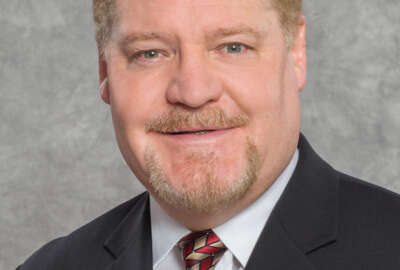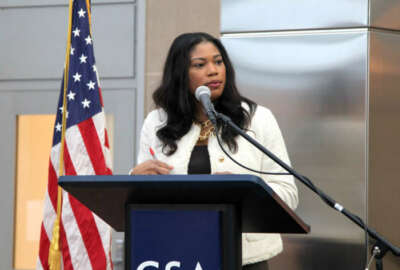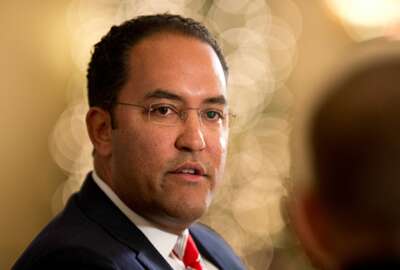
Hubbard Radio Washington DC, LLC. All rights reserved. This website is not intended for users located within the European Economic Area.
Hubbard Radio Washington DC, LLC. All rights reserved. This website is not intended for users located within the European Economic Area.
The Modernization Government Technology Act received approval from the Oversight and Government Reform Committee on Sept. 15 and will likely get voted on by the...
The White House and leading House members found a happy medium when it comes to promoting and funding agency IT modernization efforts, but whether or not this compromise comes to fruition may just come down to the will of a few senators.
The full House is expected to pass Rep. Will Hurd’s (R-Texas) Modernization Government Technology Act, which the Oversight and Government Reform Committee approved Sept. 15, as early as Tuesday.
Senators on the Homeland Security and Governmental Affairs and the Appropriations committees are far from agreeable on the bill’s approach of creating working capital funds in each agency specifically for IT modernization, and creating a centralized pot of money owned by the Office of Management and Budget and managed by the General Services Administration.
Multiple industry and Hill sources said there are some who are wary of creating another working capital fund, given so many already exist across the government.
According to the White House budget request for fiscal 2017, 17 agencies currently have this type of funding mechanism. For instance, the Commerce Department has working capital funds at the headquarters level, the Census Bureau and the National Institute of Standards and Technology. Additionally, the Environmental Protection Agency, GSA and the departments of Justice, Treasury, State, Labor, Transportation and Interior are among the agencies with working capital funds.
Some question whether creating yet another working capital fund makes sense given the power and influence agency chief information officers are supposed to have under the Federal IT Acquisition Reform Act.
And in that same vein, the bill doesn’t explicitly give CIOs power over these working capital funds.
Trey Hodgkins, senior vice president of the IT Alliance for Public Sector, said his organization met Senate staff members and their biggest concern seems to be around whether it makes more sense to change the current working capital funds instead of creating new ones.
“We don’t think it is, but there were enough questions from the Senate side to take a pause and assess this and understand all different things,” Hodgkins said. “Almost all of those funds were created with a singular reason. We cannot identify funds for use across the CFO Act agencies and because of the singular nature of all the statutes, they would need to be modified. Our concern also is we are ‘breaking’ into someone else’s piggy bank. There are internal and external agency clientele who are users of the working capital funds.”
A Hill staff member said the Senate first wants to do no harm and make sure whatever is done is the best thing for the agencies to modernize IT.
“It will be interesting to see how the Senate responds to the House bill because it was somewhat unfavorable to the administration’s IT Modernization Fund and Hurd’s MOVE-IT Act. So if the new bill combines both, it will be an interesting conversation in the Senate,” the staff member said.
A House aide said the committee has been working with the Senate since the beginning and will continue to do so to iron out any differences.
Another big issue for the Senate is having GSA manage the centralized ITMF. Several sources told me that some believe GSA is using the fund to pay for its new Technology Transformation Service (TTS), launched in May and combining the 18F organization, the Presidential Management Fellows program and the Office of Citizen Service and Innovative Technologies.
One provision specifically in the bill is of great concern, sources said. It would give OMB the power to reach into agency working capital funds to pay back the centralized fund. In the section of the bill describing the use of the working capital fund money, the bill details four uses, including retiring and replacing legacy systems, transitioning to cloud computing, for cybersecurity needs and for the “reimbursement of funds transferred from the Information Technology Modernization Fund.”
By letting OMB potentially control the use of these funds, the concern is whether the provision would disincentivize agencies to move off legacy systems because they would lose the money they saved.
Rich Beutel, a former House Oversight and Government Reform Committee staffer who helped write FITARA and now is president of Cyrrus Analytics, said the objections by the Senate are overstated.
“Most objections are from HSGAC majority staff and their detailee,” Beutel said. “The detailee is going back to OMB in just a couple of weeks in any event and was primarily concerned with OMB’s inability to properly oversight each agency and their use of the newly created budget flexibility. Our view is that this should be solved by OMB not by opposing the legislation, but by staffing any needed oversight in a prudent fashion.”
Beutel said OMB and federal CIO Tony Scott fully support the legislation.
Scott said in late August he supported some kind of combination bill that would meet the need for immediate funding, but also long-term needs.
Beutel said the heart of the MGT Act is built on what didn’t make it into FITARA because of appropriations committee concerns.
“Breaking the chokehold caused by the current appropriations process is essential to the meaningful deployment of agile based development methodologies and modern approaches to IT development and deployment,” he said. “This bill provides an IT exit strategy from the current ‘chicken and egg’ situation where agencies are tasked to fund transition from old legacy systems while simultaneously spending the bulk of their budget on maintenance and patching of antiquated systems that are ubiquitous across the agencies.”
Another interesting piece of the bill is what didn’t make it in the latest version. During the committee markup, Hurd decided to remove language that promoted shared services.
Hodgkins said the reason Hurd removed the shared services provision was for several reasons. First, he said there was concern it would complicate the discussion process and most stakeholders agreed that having a clean bill focusing on IT modernization was most important.
“We were contemplating adding a number of things and this was tacked on. But our concern was shared services was too complex to get through the committee, let alone the floor and the suspension calendar,” Hodgkins said. “The construct of the bill had bipartisan support and we thought it made sense to revisit these other issues at another point in time. It’s not an indicator of opposition, but a congressional strategy for moving the bill forward. We weren’t measuring the merits or demerits of shared services. We were looking at political possibilities and the congressional calendar. We are strongly committed to making the bill happen in this Congress. A lot of groups concluded best way was to keep it as clean as possible and focus on the original concepts that had bipartisan support.”
Hodgkins said the committee also removed several other provisions during the drafting of the bill, including the requirement for an IT inventory at each agency and the requirement to improve the cloud security program known as the Federal Risk Authorization and Management Program (FedRAMP).
Mike Hettinger, a former Hill staff member and now president and managing principal of Hettinger Strategy Group, said there also is a concern that the current view of shared services doesn’t meet the vision for IT modernization.
“Given the current shared services efforts in government, which mainly consist of moves to federal shared service providers, in most cases running older technology, there was concern that the provision as drafted in MGT could have allowed for the flexibilities provided in the bill to be used for what amounts to a legacy to legacy migration,” he said. “It’s important that agencies have a way to fund IT modernization and the working capital funds proposed in the bill are a big step in the right direction.”
Hodgkins and others said it’s unlikely the Senate will consider a companion bill or the House bill before the election, but there is a fair amount of optimism that an IT modernization bill will get to the President before the end of the year.
Return to the Reporter’s Notebook
Copyright © 2024 Federal News Network. All rights reserved. This website is not intended for users located within the European Economic Area.
Jason Miller is executive editor of Federal News Network and directs news coverage on the people, policy and programs of the federal government.
Follow @jmillerWFED


